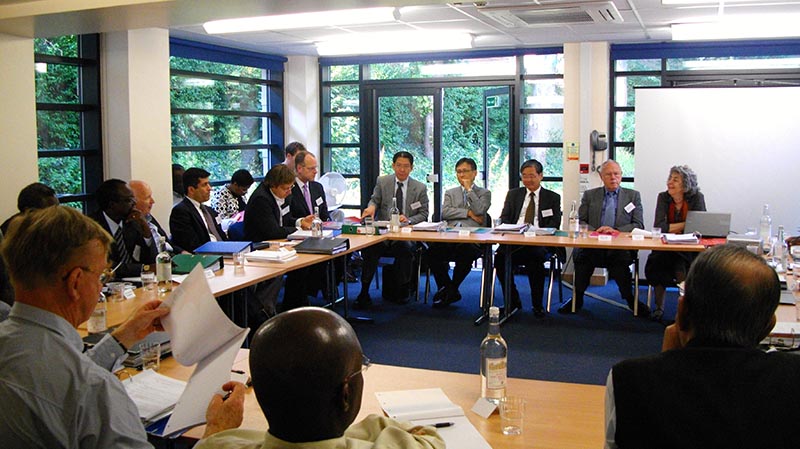Final Workshop for "Ethnic Diversity and Economic Instability in Africa" Project Convened in U.K.
2011.08.17
JICA-RI hosted the fourth and last workshop for a research project “Ethnic Diversity and Economic Instability in Africa” at Oxford University in U.K. from July 15 to July 16. Nearly 40 researchers and officials of aid organizations, who specialize in Africa, participated from Japan, U.K, Belgium, Hong Kong, and Tanzania, among others. From JICA-RI, senior research advisor Keiichi Tsunekawa, senior advisor to the director general Koji Yamada, and research associate Kohei Yoshida attended. This research project looks into the mechanism of the negative correlation between ethnic diversity and economic development in Africa comprehensively through interdisciplinary methods, and seeks measures to realize economic growth in multi-ethnic societies.
At the beginning of the workshop, the participants in charge presented drafts of nine papers, which were peer-reviewed by all including the rest of attendees. Following this session, they took time to reflect on the findings at three previously-held workshops and exchanged opinions in order to draw implications for policies and systems in Africa.
Among the presenters, Professor Daniel Posner of Massachusetts Institute of Technology studied the average number of years of each ethnic group’s education by using panel data from the Kenya’s Demographic and Health Survey, and showed that children of certain ethnic groups received education for a longer period of time. This indicates that ethnicity-driven favoritism under centralized political systems could interfere with equal distribution of public services.
Dr. Arnim Langer of Catholic University of Leuven, in Belgium, and Professor Frances Stewart of Oxford University jointly compared and examined the effectiveness and risks of direct and indirect policies which are adopted to reduce horizontal inequality in a multi-ethnic environment. They stressed that a suitable policy varies depending on each country’s circumstance and affirmative actions for correcting ethnic inequality pose risks of further enhancing ethnic consciousness. Meanwhile, Professor Motoki Takahashi of Kobe University explained that policies which directly tackle the cause of horizontal inequality could be effective to redress the imbalance. Referring to the Kenyan land ownership system, he pointed out that interethnic violence in the country had stemmed from changes in land ownerships. Takahashi said, “The rapid population growth in Africa in the 21st century will accelerate the scarcity of land, bringing even higher chances of land issue-originated violence. In order not to repeat the case of Kenya in other parts of Africa, institutional reforms to build the regulatory framework on private land ownerships are essential.”
Professor Yash Ghai of the University of Hong Kong, who helped draw up the draft of Kenya’s new Constitution in consideration of ethnic diversity, insisted that it is necessary for the Constitution to include articles on decentralization of administrative, financial and legislative functions, as well as on affirmative actions to protect minority groups.
Summing up the workshop, JICA-RI’s special fellow Hiroyuki Hino—the project leader, and economic advisor for Kenya’s Prime Minister’s office—concluded that various policies are advisable including: 1) Establishing a more decentralized system to discourage political leaders from taking actions to possibly agitate interethnic antagonism for their political purposes; 2) Considering ethnic diversity as a positive condition and investing in state-building that is not affected by ethnic differences; and 3) Creating land policies, natural resources management policies, and appropriately managing incoming foreign funds, all of which directly tackle the causes of interethnic horizontal inequality.
JICA-RI plans to disseminate the project results in working papers and books, and through a public symposium to be held in Tokyo.

Related Research Area: Growth and Poverty Reduction
Related Research Project: Ethnic Diversity and Economic Instability in Africa

事業事前評価表(地球規模課題対応国際科学技術協力(SATREPS)).国際協力機構 地球環境部 . 防災第一チーム. 1.案件名.国 名: フィリピン共和国.

事業事前評価表(地球規模課題対応国際科学技術協力(SATREPS)).国際協力機構 地球環境部 . 防災第一チーム. 1.案件名.国 名: フィリピン共和国.

事業事前評価表(地球規模課題対応国際科学技術協力(SATREPS)).国際協力機構 地球環境部 . 防災第一チーム. 1.案件名.国 名: フィリピン共和国.

事業事前評価表(地球規模課題対応国際科学技術協力(SATREPS)).国際協力機構 地球環境部 . 防災第一チーム. 1.案件名.国 名: フィリピン共和国.

事業事前評価表(地球規模課題対応国際科学技術協力(SATREPS)).国際協力機構 地球環境部 . 防災第一チーム. 1.案件名.国 名: フィリピン共和国.
scroll